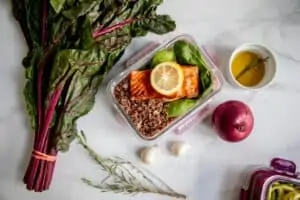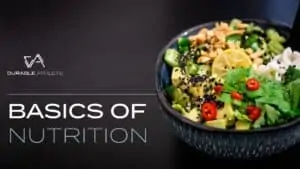“You are what you eat” has a much deeper relevance than how foods affect our physique.
In truth, the foods that you eat are literally what you are made out of!
Whole foods are rich in minerals, vitamins, amino acids, and various other compounds that act as the building blocks and maintenance parts of your body … which is why eating the right ones can make a huge impact on your recovery!
If you’re recovering from an injury (or even just a bout of intense soreness), don’t discount food as a source of healing.
Try adding these foods to your diet to support recovery:
Foods That Support Injury Recovery

1. Salmon
Salmon is rich in both protein and omega-3 fatty acids: two powerhouse nutrients for recovery. Protein is broken down into several amino acids that form the building blocks of our muscles and tissues, so providing these nutrients post-injury could help speed up healing. Plus, studies show that the omega-3 in salmon may also promote wound healing, immune response, and reduce inflammation (which may be present during and after an injury).
2. Protein
Again: protein is rich in the amino acids needed for our tissues to repair themselves. Specifically, proteins in poultry contain glutamine and arginine, which have been shown in studies to help boost collagen production (the compound our skin, ligaments, and tendons are made out of) and promote wound healing. Whether you consume animal proteins or are vegan, getting enough protein is essential.
If you consume animal protein, focus on (preferably organic): chicken, turkey, beef, venison
If you are vegan or vegetarian: plenty of legumes (beans), seeds, quinoa, and tofu
3. Greens
Leafy greens like kale, spinach, arugula, and chard, as well as green veggies like broccoli, bok choy, cabbage, and fennel, are all rich in antioxidant compounds and vitamin C, both of which assist in collagen production and wound and DNA repair. Not to mention, leafy greens contain certain polyphenols, like the antioxidant quercetin, that can help suppress the production of inflammatory proteins.
Drizzle your greens and veggies in extra virgin olive oil, and you’ll have a double whammy of antioxidant and anti-inflammatory compounds!
4. Sweet Potatoes
 With the rise of Keto and other low-carb diets, we tend to shy away from any mention of carbs. However, did you know that carbs play a big role in wound healing? Indeed. Carbs contain enzymes like hexokinase, which have shown in studies to assist in repair.
With the rise of Keto and other low-carb diets, we tend to shy away from any mention of carbs. However, did you know that carbs play a big role in wound healing? Indeed. Carbs contain enzymes like hexokinase, which have shown in studies to assist in repair.
Not to mention, other studies have shown that not getting enough carbs can actually interfere with your body’s ability to recover.
The key with carbs is to avoid the processed variety and focus on whole food carb sources, like those from sweet potatoes, regular potatoes, winter squashes, and grains like quinoa and legumes.
5. Berries, Citrus, and Other Fruits
Berries and citrus fruits like oranges and grapefruits are another rich source of antioxidants and vitamin C, which is a powerhouse for tissue repair and collagen formation. The antioxidant compounds that give berries their vibrant colors are also potent inflammation inhibitors, which can help ease soreness and discomfort after an injury.
Dates are also an excellent sources of minerals like potassium, which can also help ease inflammation.
6. Nuts and Seeds
Nuts and seeds like walnuts, almonds, sunflower and pumpkin seeds are a good source of protein, plus essential vitamins for soothing inflammation, like vitamin E. Plus, they’re rich in joint-lubricating fatty acids that help keep joints mobile and may reduce joint inflammation.
A small handful of nuts per day is enough to cash in on their benefits.
The Bottom Line
Food is life. It contains the same compounds that you’re made out of! Fueling up on the right foods during recovery can help assist in tissue repair and reduce inflammation during the healing process.
For more nutrition tips and information, check out the Nutrition section on the Durable Athlete App (you get 14 Days FREE when you sign up!):
